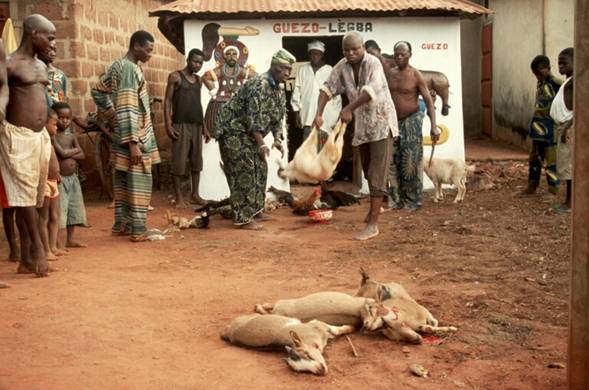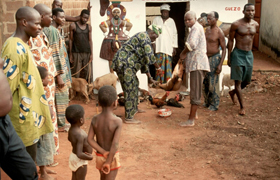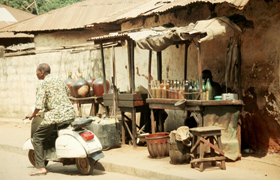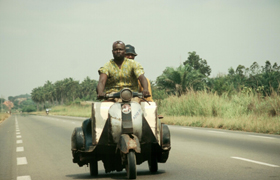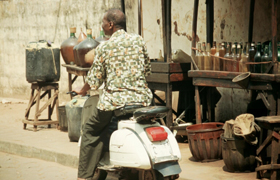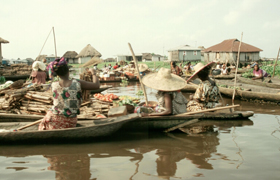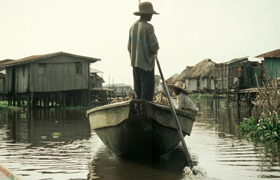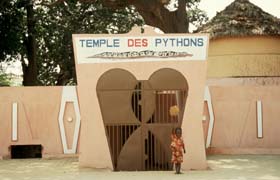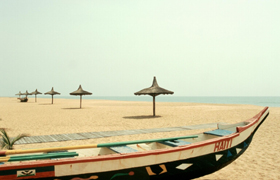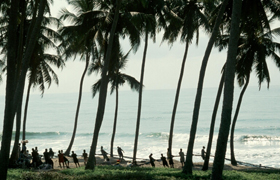Voodoo and Vespas
Another kid was thrown unceremoniously onto the hard earth by my feet. That made five of them, all with their necks slit, the last still twitching involuntarily in the final throes of death. Along with the fourteen chickens already killed, this was quite some killing spree.
An out of the ordinary scene for almost anywhere in the world bar Benin. Yet walking through the village of Abomey in this little-known corner of West Africa, the voodoo sacrifice I had stumbled across seemed to be a commonplace, everyday occurrence. Unused to the trespass of tourists I was warmly welcomed by the villagers as the fetischeur slaughtered the animals, letting the life drain from them before sprinkling their blood onto a phallic-like shrine.
Voodoo is stereotyped, even dismissed, in the west as a primitive, sexually licentious animist faith based on superstition and spectacle. Yet in Benin, the home of voodoo, some eighty percent of the population believe and their belief is more than skin deep. Literally as well as metaphorically for the villagers of Ouidah, whose voodoo faithful bear deep scars on their faces as evidence of their worship of the python.
Yet for a religion so engrained in society it is difficult to grasp its essence, its meaning. In Abomey goats and chickens were being slaughtered to appease the gods. In Ouidah, whilst some forty pythons were worshipped in the gaudily decorated Python Temple as gods, the guardian of the temple was happy to see an atheistic herperphobe as myself photographed with one of his deities around my neck.
“Why the python? What is the significance of the python?” I asked the guardian of the temple.
“Because they have powers,” was his enigmatic reply.
“But why is the python thought to have these powers? Is it because they are strong? That they are big?”
“Because they have the powers” he replied again. I am not sure if he understood what I was asking or whether it really was because they had powers. Such is the mystery, and frustrating though it can be, the charm of Benin.
Benin may be a narrow strip of a country sandwiched between Togo and Nigeria in West Africa but its slender size belies its beguiling charm. There is much more to this intriguing and enchanting country than voodoo. If there were guidebooks written on Benin they would talk about sights such as Pendjari National Park. Little known outside of the Francophone countries, Pendjari has lion, leopard, buffalo and is arguably the best game park in the whole of West Africa.
Ganvié would also be sure to feature in this yet-to-be-written guidebook. A charming pirogue ride took me through tranquil channels of water hyacinth and fishing nets to the village. Here I found find stilted houses emerging shakily from the water, seeking the safety of dry land. Crowned with corrugated iron, rusted and bent by time, these tiny houses leaned and tilted in ramshackle disorder. At the water’s edge mothers cleaned cutlery, wives washed their husbands' clothes and young girls shampooed their hair. Kids played happily in the water.
Life, in all its various walks, takes place on or near the water. A UN team of doctors travelled from boat to boat vaccinating the young against polio. A funeral floated past in lugubrious silence. The floating market, a riot of colour, bobbed gently up and down in the barter of exchange.
Interesting though they may be, such sights are the staple diet of glossy tourist pamphlets and miss the essence of Benin. Benin is all about the bizarre, the unusual, the incidental. It is what goes on behind the brochure that is truly fascinating.
The coast is picture postcard material with palm-lined golden beaches and the roar of crashing surf. But it is the fishermen, who ply their trade to ancient songs as the morning hauling-in of the nets is accompanied by deep rhythmic chanting, that really delighted me. In a more flippant moment, I have no doubt that if tug-of-war were to become an Olympic sport, the Beninois would most certainly be strong medal contenders.
Driving inland, there was no limit to the variety of scenes that wheeled past, no restrictions on numbers of passengers and cargo. Fridges, televisions, panes of glass, chickens stuffed in wire mesh cages were some of the paraphernalia on the move. Car boots overflow and spew forth people’s livelihoods – a boot that is shut an alien concept - lorries wallow, like ocean liners in distress in heavy seas, under loads piled impossibly high. The Beninois have taken the art form of creative packing to a higher level, no pun intended.
The vespas buzzing around brought an incongruous smile to my face. The makeshift petrol stations – a table with a dusty collection of bottles – made me laugh out loud. But most amusing of all were the antiquated three-wheeler mopeds. Salvaged from scrap and cobbled together in an outlandish way, reminiscent of Mad Max, they are literally rusty barrels on three wheels. Rusty barrels full of fuel - these oversized vespas are driven to next door Nigeria to fill up with cheap petrol and the smoking smugglers return, sitting on the fuel. Miraculously I didn’t see any go up in flames.
With its fetish priests and fishermen, voodoo and vespas, I became more and more convinced that magic does indeed pervade this little known corner of Africa.
|
|
|
